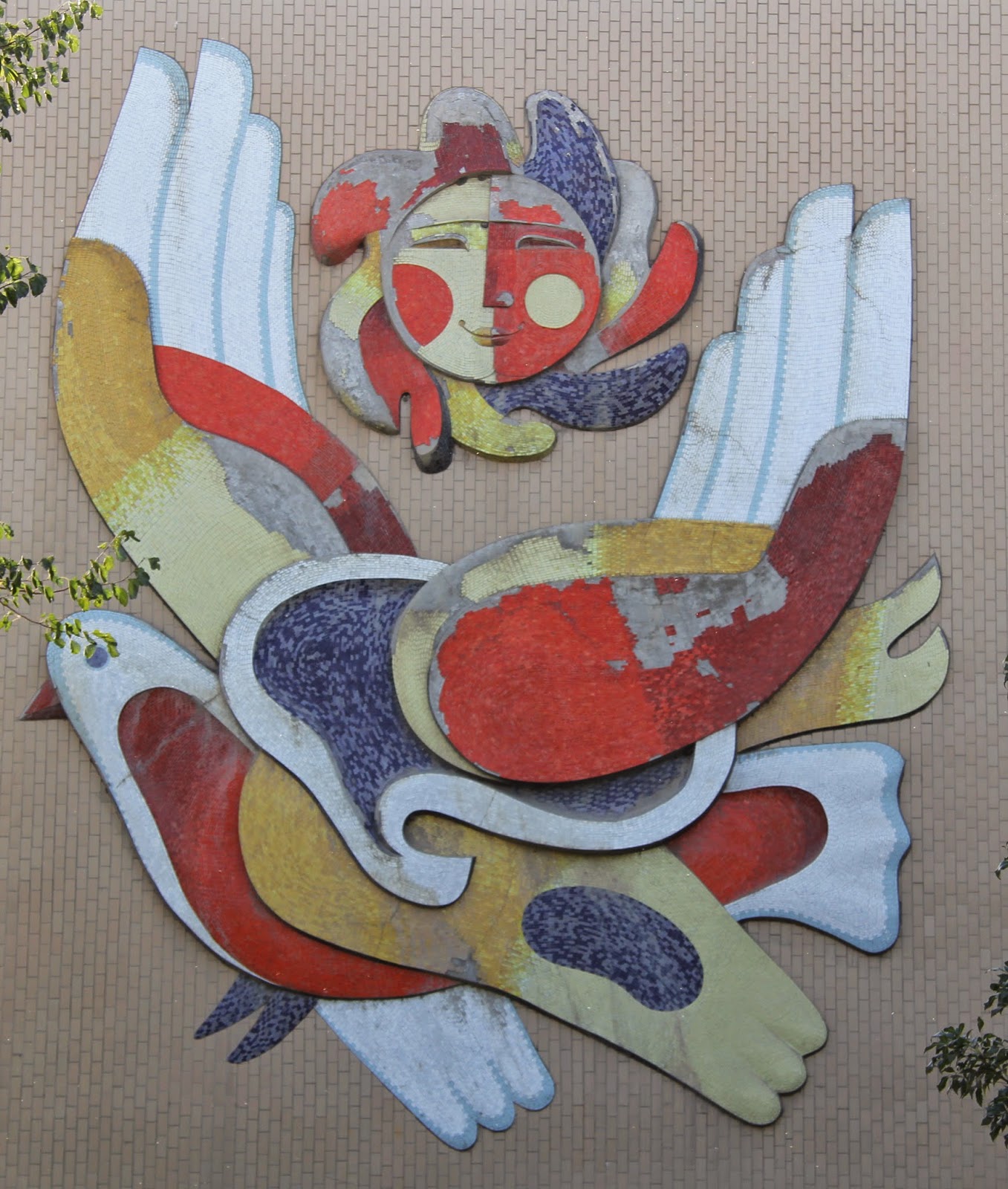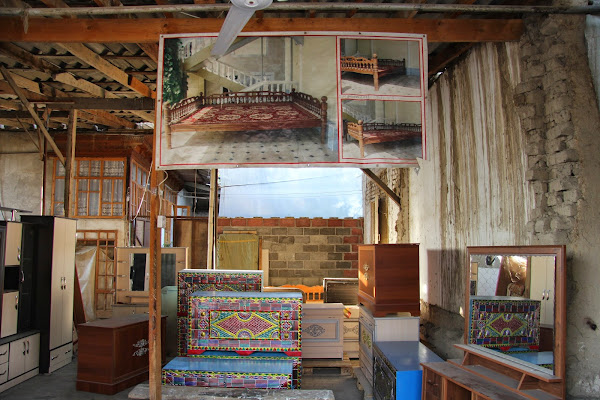 |
| Och, Alimbek Datka Square. |
 |
| Motif sur la façade du Bureau d'Enregistrement des Mariages ! rue Kurmanjan-Datka. |
- Everything started with a fight in a restaurant, had told me Dariya when we were in the fly to Bishkek.
Och has been the theater of violent inter-ethnic clashes during summer 2010. The madness shook the city and the Kyrgyz were going after the Uzbek minority. Results : hundreds of victims and 2000 burned homes. Thousands of Uzbeks ran away in Uzbekistan. Tashkent announced that it has taken in its Ferghana more than 100000 refugees. A number of them came back later after the Kyrgyz and Uzbek authorities had strongly encouraged them. So that a simple fight degenerates into such a murderous folly, latent antagonisms should be powerful.
René Cagnat provides the link between these events and the ancestral fear which Kyrgyz inspires to Uzbeks. Kyrgyz embodied the "Accursed" (title given to Genghis Khan by the Islamic world when he aspired to become a kind of emperor of Islam and legitimate sultan) and was considered as a raptor. Dariya had suggested that there had been a manipulation. The country was in crisis from the beginning of 2010. Economic problems, corruption and nepotism of president, disturbances had been so significant that a Provisional Government had been set up, compelling the president to leave the country. The new government had undertaken the revision of the Constitution and suggested making of Kyrgyzstan a parliamentary republic. The South of the country, stronghold of the fallen president, had shown itself reluctant to accept the changes decided in the North. Rumors alleged that close friends of the former regime were behind the riots in Och and in Jalalabad. The fact remains that the army did not intervene.
- The confrontations ended due to a lack of real claims, had continued Dariya. Peace came back. But my city is no longer the same. Before, we were dancing every evening on the place in front of History Museum. Now, there is no longer anyone in the streets once night has fallen.
From the rock peak which dominates the city, we have a panoramic 360-degree view. The place is called "Salomon's Throne" in honour of this Prophet-King who would have spent one night on-the-spot, but people from here also call him Dom Babura. Babur was the king of a Fergana of which Och was a part. He built the mosque on the summit of this mountain. It is an appreciated place of pilgrimage and all day long people of any age reach it. Women who desire to have a child come there because, viewed from a certain angle, it draws the contours of the body of a pregnant woman. Down from the peak, the city is not very shiny, suffocating in a pollution cloud. It will nevertheless be one of most pleasant I will have visited during my trip. It seems to me that moral standards are more liberal than in the other regions. With its walkers, its lovers in parks, its girls wearing short skirts, indifferent to the calls of the muezzin, its festive touch, maybe it tries to exorcise its painful past. But, if it is not the no-man's-land described by Dariya, it is not Paname either. In the evening, only a few restaurants are opened. I choose out of curiosity an Italian restaurant close to the hotel and from which the noise wake me up every night at two in the morning. Deep armchairs, sober decoration, well supplied bar. Very few people when I go to it. A group of girls, a young man who downs vodkas-Redbull constantly while his female companion is looking at him with consternation, and some party animals, smoking the water pipe and drinking beer, Coke and cognac. My pizza is delicious. The atmosphere is wavering in a curious mixture of local and electro music. Sometimes, an invisible DJ speaks. The pitch varies from a normal to an unbearable level. A large area between the armchairs and the bar must serve as a dance floor when come the time to mosh. This night, again, I will be woken by the aggressive sound emanating from the restaurant.
The big Jayma market is a city in the city, mainly constituted of metallic containers recycled in warehouses and shops. Number of kalpaks (white felt high-crowned cap with black border) and products imported by nearby China. In invisible speakers, a soft and monotonous female voice, speaks continuously. Like most markets, it is organised in corporate districts. There is a district of the smiths, the one of the tinsmiths and the one of the carpenters. I end up meeting a tapshan manufacturer. His name is Mirzohit and works Matrosova Street. He can make me a tapshan for 500 or 600 dollars. His tapshans are basic, without embellishment, Swedish sobriety.
- I send you pieces and you assemble them yourself, he tells me.
Och has been the theater of violent inter-ethnic clashes during summer 2010. The madness shook the city and the Kyrgyz were going after the Uzbek minority. Results : hundreds of victims and 2000 burned homes. Thousands of Uzbeks ran away in Uzbekistan. Tashkent announced that it has taken in its Ferghana more than 100000 refugees. A number of them came back later after the Kyrgyz and Uzbek authorities had strongly encouraged them. So that a simple fight degenerates into such a murderous folly, latent antagonisms should be powerful.
René Cagnat provides the link between these events and the ancestral fear which Kyrgyz inspires to Uzbeks. Kyrgyz embodied the "Accursed" (title given to Genghis Khan by the Islamic world when he aspired to become a kind of emperor of Islam and legitimate sultan) and was considered as a raptor. Dariya had suggested that there had been a manipulation. The country was in crisis from the beginning of 2010. Economic problems, corruption and nepotism of president, disturbances had been so significant that a Provisional Government had been set up, compelling the president to leave the country. The new government had undertaken the revision of the Constitution and suggested making of Kyrgyzstan a parliamentary republic. The South of the country, stronghold of the fallen president, had shown itself reluctant to accept the changes decided in the North. Rumors alleged that close friends of the former regime were behind the riots in Och and in Jalalabad. The fact remains that the army did not intervene.
- The confrontations ended due to a lack of real claims, had continued Dariya. Peace came back. But my city is no longer the same. Before, we were dancing every evening on the place in front of History Museum. Now, there is no longer anyone in the streets once night has fallen.
From the rock peak which dominates the city, we have a panoramic 360-degree view. The place is called "Salomon's Throne" in honour of this Prophet-King who would have spent one night on-the-spot, but people from here also call him Dom Babura. Babur was the king of a Fergana of which Och was a part. He built the mosque on the summit of this mountain. It is an appreciated place of pilgrimage and all day long people of any age reach it. Women who desire to have a child come there because, viewed from a certain angle, it draws the contours of the body of a pregnant woman. Down from the peak, the city is not very shiny, suffocating in a pollution cloud. It will nevertheless be one of most pleasant I will have visited during my trip. It seems to me that moral standards are more liberal than in the other regions. With its walkers, its lovers in parks, its girls wearing short skirts, indifferent to the calls of the muezzin, its festive touch, maybe it tries to exorcise its painful past. But, if it is not the no-man's-land described by Dariya, it is not Paname either. In the evening, only a few restaurants are opened. I choose out of curiosity an Italian restaurant close to the hotel and from which the noise wake me up every night at two in the morning. Deep armchairs, sober decoration, well supplied bar. Very few people when I go to it. A group of girls, a young man who downs vodkas-Redbull constantly while his female companion is looking at him with consternation, and some party animals, smoking the water pipe and drinking beer, Coke and cognac. My pizza is delicious. The atmosphere is wavering in a curious mixture of local and electro music. Sometimes, an invisible DJ speaks. The pitch varies from a normal to an unbearable level. A large area between the armchairs and the bar must serve as a dance floor when come the time to mosh. This night, again, I will be woken by the aggressive sound emanating from the restaurant.
The big Jayma market is a city in the city, mainly constituted of metallic containers recycled in warehouses and shops. Number of kalpaks (white felt high-crowned cap with black border) and products imported by nearby China. In invisible speakers, a soft and monotonous female voice, speaks continuously. Like most markets, it is organised in corporate districts. There is a district of the smiths, the one of the tinsmiths and the one of the carpenters. I end up meeting a tapshan manufacturer. His name is Mirzohit and works Matrosova Street. He can make me a tapshan for 500 or 600 dollars. His tapshans are basic, without embellishment, Swedish sobriety.
- I send you pieces and you assemble them yourself, he tells me.
 |
| Magasin d'un artisan (Mirzohit) dans le bazar Jayma à Och. |
Meeting in front of the local administration building where is still the Lenin statue. Always the same story of gold mine. In the park which extends along the Ak-Buura river, about fifteen people seat on a tapschan. In the middle, a pile of food and drinks. They forbid me to photograph them. But quite often, people answer me favorably and do not hesitate to pose.
 |
| Femmes sur un tapchane de la chaïkhana Aydap-Ata, rue Aytiev. |
 |
| Café Bayana, rue Lénine. |
 |
| Famille sur un tapchane au pied de la montagne du Trône de Salomon. |
 |
| Kiosque-aiwan à côté de la bibliothèque Toktogula. |
 |
| Homme endormi, square Alimbek Datka. |
More photos
No comments:
Post a Comment